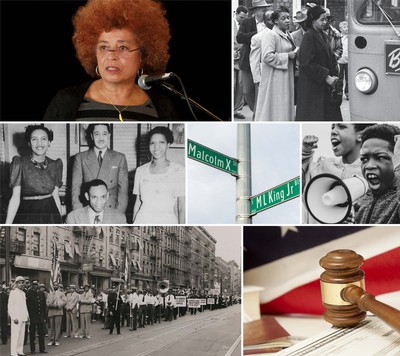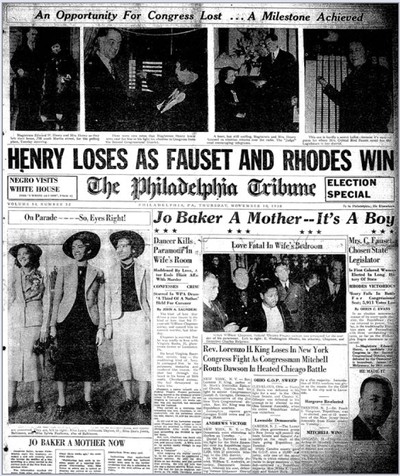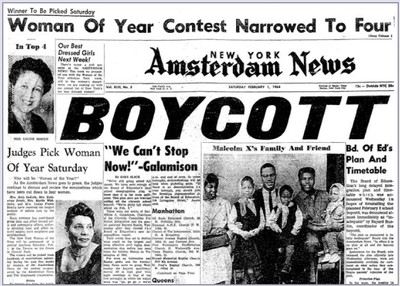The Free Library is pleased to announce a new digital resource that provides access to the most distinguished African American Newspapers in the United States. Cardholders now have access to 10 historic Black newspapers that help piece together a fuller story of American history, which features stories that were omitted from textbooks and mainstream newspapers.
The Historical Newspapers – Black Newspapers collection from ProQuest, provides remote full-text access to The Philadelphia Tribune (1912-2001), The Chicago Defender (1910-1975), The Pittsburgh Courier (1911-2002), The New York Amsterdam News (1922-1993), The Atlanta Daily Word (1931-2003), The Baltimore Afro-American (1893-1988), The Los Angeles Sentinel (1934-2005), The Michigan Chronicle (1936-2010), The Norfolk Journal and Guide (1916-2013), and The Cleveland Call and Post (1934-1991). Users can search across this entire collection, or use our direct link to access The Philadelphia Tribune by itself.
Black newspapers help tell a more complete story of American history. Their stories cover news and issues that impact Black people, that would not be told elsewhere, and would certainly not be told from a Black perspective. ProQuest describes the collection as providing "unprecedented access to perspectives and information that was excluded or marginalized from mainstream sources." The content includes primary sources like articles, obituaries, photos, editorials, and more, and is easily accessible to students, researchers, and anyone who wants to learn more about the history of race relations, journalism, local and national politics, education, African American studies, and more. With coverage of the first Black White House correspondent and stories of the cultural explosion of the Harlem Renaissance, to Philadelphia-centric events, like police brutality under Mayor Frank Rizzo, the murder of Octavius V. Catto, and the emergence of Philadelphia soul, these publications "reveal history as it was being made, by the people who experienced it."
More about select newspapers:
The Philadelphia Tribune (1912-2001)
The oldest continuously published daily Black newspaper in the U.S., The Philadelphia Tribune was founded by Christopher James Perry. His paper conveyed ideas and opinions about local and national issues affecting blacks in the post-emancipation period, and today continues to serve the country’s fourth-largest African American community. The Philadelphia Tribune campaigned to appoint Black citizens to the board of education, city council, and the judiciary. It actively supported the growth of the United Way fund and launched a "clean block" program, promoting the health, safety, and well-being of the city’s residents. The newspaper fought against segregation and rallied against the race riots in Chester, Pennsylvania. Access nearly 90 years of news written by and for African Americans.
Chicago Defender (1910-1975)
The Chicago Defender has been a leading voice of the Black community well beyond the Windy City, with more than two-thirds of its readership outside Chicago. The newspaper was a proponent of The Great Migration, the move of over 1.5 million African Americans from the segregated South to the industrial North from 1915 to 1925. It reported on the Red Summer race riots of 1919 and editorialized for anti-lynching legislation and the integration of Blacks into the U.S. military. This newspaper also supported the aviation career of Bessie Coleman, the first African American female pilot, and promoted the writing of Langston Hughes, a poet and leader of the Harlem Renaissance, and Gwendolyn Brooks, poet laureate of Illinois. Over six decades of this newspaper’s historic coverage is available online and easily searchable for both researchers and readers.
New York Amsterdam News (1922-1993)
From an initial $10 investment, the New York Amsterdam News grew to become one of the nation’s leading Black newspapers and one of New York’s most influential Black-owned institutions. For nearly a century, it has helped influence and promote the causes and aspirations of African Americans. Contributors have included W. E. B. Du Bois, Roy Wilkins, Adam Clayton Powell, Jr., and Malcolm X. The New York Amsterdam News captured the vibrancy and cultural richness of the Harlem Renaissance in the 1920s, advocated for the desegregation of the U.S. military during World War II, and fought against discriminatory employment practices and other civil rights abuses in the 1960s. More than 70 continuous years of cover-to-cover news from this remarkable publication is available online now.
The Baltimore Afro-American (1893-1988)
Founded by former slave John Henry Murphy, Sr. when he merged three church publications, The Baltimore Afro-American became one of the most widely circulated African American newspapers on the Atlantic Coast. In addition to featuring the first Black female reporter (Murphy’s daughter) and female sportswriters, the paper’s contributors have included writer Langston Hughes, intellectual J. Saunders Redding, artist Romare Bearden, and sports editor Sam Lacy, whose column influenced the desegregation of professional sports. Through the decades, the newspaper fought for equal employment rights, urged African American participation in politics, and advocated state-funded higher education for Blacks. In the 1930s, The Afro-American launched "The Clean Block" campaign, which is still in existence today, to clean up inner-city neighborhoods and fight crime. The paper stationed correspondents in Europe and the Pacific during World War II, providing first-hand reports to readers. In the 1950s, working with the National Association for the Advancement of Colored People (NAACP), the newspaper’s efforts contributed to the outlawing of public-school segregation. To see history being made, start here.
The Norfolk Journal and Guide (1916-2003)
Under the leadership of P.B. Young, the "Dean of the Negro Press," The Norfolk Journal and Guide became one of the best-researched and written newspapers of its era, with a circulation of more than 80,000 by the 1940s. It argued against restrictive covenants, rallied against lynching, encouraged blacks to vote, supported improvements to city streets and water systems, and more. In contrast to other Black newspapers, such as the Chicago Defender (with which The Norfolk Journal and Guide is cross-searchable), this newspaper campaigned against The Great Migration of Southern laborers to the North. It was one of only a few Black newspapers to provide on-the-scene coverage of the 1930s Scottsboro trial and helped raise legal funds for the nine young black defendants.
Find links to the Historical Newspapers – Black Newspapers collection at freelibrary.org. You’ll need your Free Library card number and PIN to log on. For more in-depth information about this collection and each of the newspapers, please view ProQuest’s Historical Black Newspapers digital brochure.
When you try out this collection, let us know what you’ve learned in the comments below. We’d love to hear how this resource impacts your life!
Have a question for Free Library staff? Please submit it to our Ask a Librarian page and receive a response within two business days.








